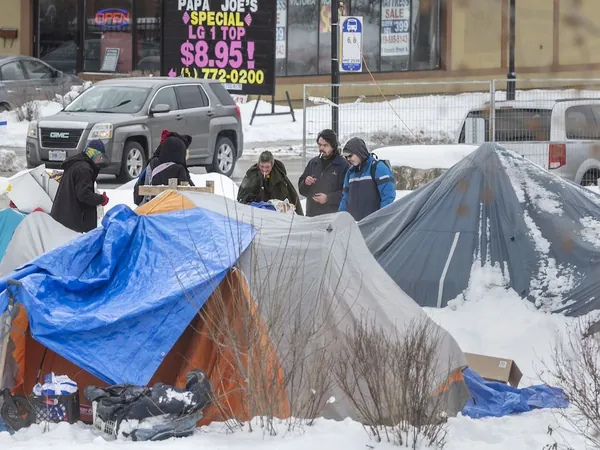
Doug Ford's Controversial Stance on Homeless Encampments: A Constitutional Clash?
2024-12-11
Author: Benjamin
Introduction
Poverty advocates have recently launched a staunch critique of Doug Ford's Ontario government as it threatens to employ the Canadian Charter of Rights and Freedoms’ notwithstanding clause to remove homeless encampments from public parks. This incendiary proposal follows a groundbreaking ruling by the Ontario Superior Court, which granted encampments a questionable form of immunity from governmental oversight by favoring claims of inadequate shelter space for the homeless.
Background
In January 2023, the Ontario Superior Court dismissed a request from the Region of Waterloo to clear a problematic encampment of around 50 residents. The area's residents had expressed frustration over rampant drug use, violence, and unsanitary conditions, despite the municipality investing more than $80,000 monthly on security and janitorial services to mitigate these issues.
Legal Precedent
Justice Michael J. Valente, in his ruling, cited a precarious legal precedent set by a 2008 British Columbia Supreme Court decision (Victoria vs. Adams). This ruling interpreted Section 7 of the Charter—protecting the right to life, liberty, and security of the person—as extending to a ‘right to shelter’ for the homeless. While this interpretation isn’t binding in Ontario, it has greatly influenced legal discourse in the province, complicating efforts to manage encampments elsewhere.
Significance of the Case
The case in Waterloo is particularly significant as it represents the first instance in Ontario where a court has halted an encampment eviction based on Section 7. The ruling has raised further questions about the implications of allowing encampments to exist despite their consequences on local communities.
Community Response
Notably, the Region of Waterloo had made considerable attempts to facilitate humane treatment of those living in the encampment. Two municipal case workers engaged with residents over several weeks, and resource fairs were conducted to connect them with housing services. Despite there being approximately 85 shelter spaces available, Justice Valente rejected the municipality's assessments, labeling many spots as inaccessible due to restrictions on drug use.
Criticism of the Ruling
Critics of the ruling argue that allowing drug use in shelters poses a significant risk. The inherent safety issues already present in shelters could be exacerbated by permitting drug consumption on the premises. Justice Valente's reliance on the perspectives of harm reduction advocates has been contested, with critics suggesting that relying on anecdotal evidence from a small study lacks sufficient rigor to form the basis of such momentous judicial decisions.
Reality of Homelessness
Moreover, the justice's assertion that every homeless individual must have access to shelter neglects the reality that not all homeless individuals are inclined to use these services. There is compelling evidence suggesting that preference for encampments often stems from the survival strategies of drug users.
Implications of Government Response
As the situation unfolds, the province's subsequent response, and the potential invocation of the notwithstanding clause, raises a host of pressing questions: How do we balance the rights of vulnerable populations with the safety and wellbeing of the broader community? Can governments effectively implement policy without judicial interference, and at what point does the judicial branch overreach its mandate?
Conclusion
Doug Ford's potential use of the notwithstanding clause could set a contentious legal precedent, signaling a new direction in Ontario's approach to homelessness and addiction policies. As the debate heats up, one thing is clear: the path ahead will be fraught with challenges, and the societal stakes could not be higher. Will Ford effectively utilize this constitutional tool to reclaim local governance, or will it amplify tensions between the government and those it seeks to serve? Only time will tell.



 Brasil (PT)
Brasil (PT)
 Canada (EN)
Canada (EN)
 Chile (ES)
Chile (ES)
 Česko (CS)
Česko (CS)
 대한민국 (KO)
대한민국 (KO)
 España (ES)
España (ES)
 France (FR)
France (FR)
 Hong Kong (EN)
Hong Kong (EN)
 Italia (IT)
Italia (IT)
 日本 (JA)
日本 (JA)
 Magyarország (HU)
Magyarország (HU)
 Norge (NO)
Norge (NO)
 Polska (PL)
Polska (PL)
 Schweiz (DE)
Schweiz (DE)
 Singapore (EN)
Singapore (EN)
 Sverige (SV)
Sverige (SV)
 Suomi (FI)
Suomi (FI)
 Türkiye (TR)
Türkiye (TR)
 الإمارات العربية المتحدة (AR)
الإمارات العربية المتحدة (AR)